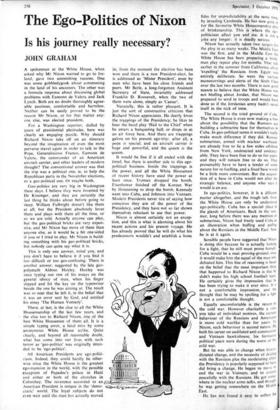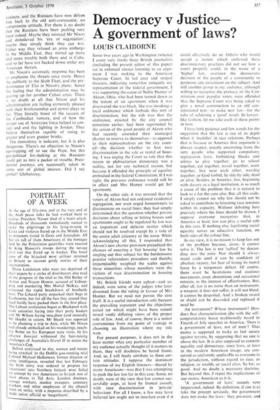The Ego-Politics of Nixon
Is his journey really necessary?
JOHN GRAHAM
A spokesman at the White House, when asked why Mr Nixon wanted to go to Ire- land, gave two astonishing reasons. One was some gobbledygook about communing in the land of his ancestors. The other was a formula response about discussing global problems with Eamonn de Valera and Jack -Lynch. Both are no doubt thoroughly agree- able pastimes, comfortable and harmless. Neither can be easily proved to be the reason Mr Nixon, or for that matter any- one else, was elected president.
For a Washington reporter, dulled by years of presidential platitudes, here was clearly an engaging puzzle. Why should Richard Nixon take off on an itinerary beyond the imagination of even the most perverse travel agent in order to talk to the Pope, Generalissimo Franco, Eamonn de Valera, the commander of an American aircraft carrier, and other leaders of modern thought? The conventional answer was that the trip was a political one, ie, to help the Republican party in the November elections, or a geo-political one. Or maybe both.
Geo-politics are very big in Washington these days. I believe they were invented by Dr Kissinger, and they are certainly the last thing he thinks about before going to sleep. William Fulbright doesn't like them at all, but the President absolutely loves them and plays with them all the time, or so we are told. Actually anyone can play, but the geo-political bricks are very expen- sive, and Mr Nixon has more of them than anyone else, so it would be a bit one-sided if you or I tried to play. Mr Nixon is build- ing something with his geopolitical bricks, but nobody can quite say what it is. '
This is only one answer, mind you, and you don't haw to believe it if you find it too difficult or too geo-confusing. There is another answer, suggested by the late geo- polymath Aldous Huidey. Huxley was once typing out one of his essays on the general idiocy of man, when his finger slipped and hit the key on the typewriter beside the one he was aiming at. The result was so neat that he left it, in the belief that it was an error sent by God, and entitled his essay 'The Human Vomedy'.
There, at last, is the clue to all the White Housemanship of the last few years, and
• the clue too to Richard Nixon, one .of the best White Housemen of them all. It is a simple typing error, a fatal miss by some anonymous White House scribe. Quite clearly, and beyond all reasonable doubt, what has come into our lives with such ten-or as `geo-politics' was originally inten- ded to be 'ego-politics'.
All American Presidents are ego-politi- cians. Indeed, they could hardly be other- wise since the White House is the greatest ego-mansion in the world, with the possible exception of Papadoc's palace in Haiti and either or both of the churches in Colombey. The reverence accorded to an American President is unique in the 'demo- eratic' world. The loyal subjects do not even wait until the man has actually moved in:. from the moment the election has been won and there is a new President-elect, he is addressed as 'Mister President', even by men who have been his close friends and peers. Mr Berle, a long-forgotten Assistant Secretary of State, invariably addressed Franklin D. Roosevelt, when the two of them were alone, simply as 'Caesar'.
Naturally, this is rather pleasant. It is just the sort of constructive criticism that Richard Nixon appreciates. He dearly loves the trappings of the Presidency; he likes to hear the band play 'Hail to the Chief' when he enters a banqueting hall, or drops in at an air force base. And there are trappings galore on his present ego-trip: after all, a pope is special, and an aircraft carrier is huge and powerful, and the queen is the queen.
It would be fine if it all ended with the tinsel, but there is another side to this ego- political business. Inside the trappings is the power, and all the White Housemen of recent history have used the power at least once. Truman dropped the bomb, Eisenhower finished off the Korean War by threatening to drop the bomb, Kennedy went into Cuba, and Johnson into Vietnam. Modern Presidents never tire of saying how conscious they are of the power of the Presidency, and they have not so far shown themselves reluctant to use that power.
Nixon is almost certainly not an excep- tion, and this is what is alarming about his recent actions and his present voyage. He has already proved that he will do what his predecessors. wouldn't and establish a bona
fides for unpredictability at the same time by invading Cambodia. He has now gone in
for the favourite White Housemanship ploy of brinkmanship. This is where the ego. politicians affect you and me. It is not a joke any longer: it is deadly serious.
Nixon has actually taken two targets for the ploy in as many weeks. The Middle East was the first, and in the Middle East the White House has been preparing a brink. thanplay repeat play for months. That talk earlier in the summer from California about 'expelling' the Russians from Egypt was entirely deliberate. So were the various manoeuvrings and alerts of the Sixth Fleet over the last two months. There is now good reason to believe that the White House was not bluffing about Jordan, that Nixon was prepared to send in troops and would have done so if the Jordanian army hadn't saved itself in the nick of time.
The second is the tried ground of Cuba. The White House is even now making a fuss
about- the possibility that the Russians are building a submarine base for themselves in Cuba. In geo-political terms it wouldn't really make much difference if they did. Russian submarines, armed with nuclear warheads, are already free to lie a few miles offshore from New York, undetected and undetect- able. They have been free to do so for years. and they will remain free to do so. They presumably have to have a tender of some nature for re-fuelling, and a fixed base would be a little more convenient. But the acquisi- tion of a base in Cuba would not alter the strategic balance, and anyone who says it would is an ass.
In ego-politics, however, it is a different matter altogether, and the tough talk from the White House can only be understood ego-politically. Cuba has a special place in the glands of Americans. Back in the sum- mer, long before there was any mention of submarines, Nixon had freely used Cuba as an illustration when huffing and puffing about the Russians in the Middle East. Now he is at it again.
Sensible people have suggested that Nixon is doing this because he is actually looking for a fight, that he still must prove himself. Cuba would be a neat proving-ground, since it would make him the equal of the man who defeated him. This line of reasoning is based on the belief that the most important thing that happened to Richard Nixon is that he didn't make his high school football team. He certainly gives the impression that he has been trying to make it ever since. It is not a comfortable impression, and the thought that he may be spoiling for a fight is not a comfortable thought.
Equally uncomfortable is the return to the cold war. However charitable a view you take of individual motives, the current behaviour of the Russians and Americans is more cold warlike than for years. To Nixon, such behaviour is second nature. He built his career on undiluted anti-communism and Vietnam hawkishness; his formative political years were during the worst of the cold war.
But he was able to change when historg dictated change, and the necessity of dealing with the Russians plus the moderating effect the Presidency is popularly supposed to have did bring a change. He began to move to end the war in Vietnam, and to coexist peacefully with the Russians. He got some- where in the nuclear arms talks, and thought he wks getting somewhere on the Middle East.
He has not found it easy to soften his
instincts, and the Russians have now driven him back to the old anti-communist, no compromise attitude. For there is no doubt that the Russians have been pushing very hard indeed. -Maybe they misread Mr Nixon and disbelieved his 'era of negotiation', maybe they simply think they can win. Either way they refused an arms embargo in the Middle East, they stirred up more and more trouble both there and in Cuba, and so far have not backed down under any American threats.
Mr Nixon's automatic response has been to emphasise the threats once more. Hence the publicity to the Sixth Fleet, and the pre- dominance of Tito in Nixon's plans: hence the feeling that the administration may be gearing up for another Cuban crisis. There is no doubt at all that Nixon ind his administration are feeling extremely pleased with their brinkmanship and power-plays so far. They literally boast of the success of the Cambodian venture, and of how the proper use of Amercian force helped to con- tain and end the fighting in Jordan. They believe themselves capable of rising to greater and even greater brinks.
The immodesty is indecent, but it is -also dangerous. There's no objection to Nixon's ego-tripping off to see the Pope, but this geo-political fist-shaking at the Russians could get us into a packet of trouble. Presi- dential journeys are supposedly taken in some sort of global interest. Did I say global? Globaloney.







































 Previous page
Previous page